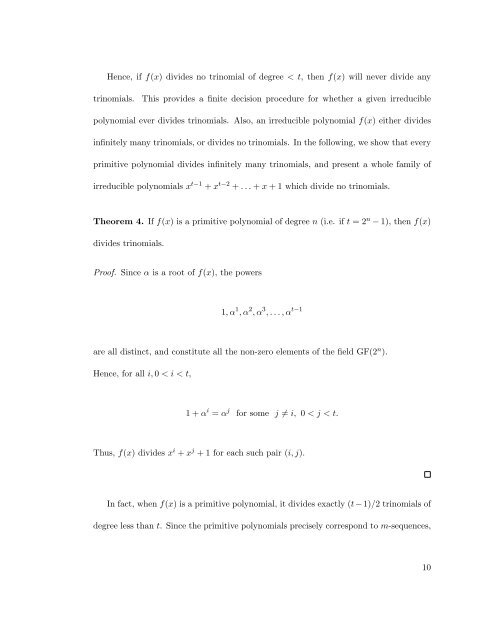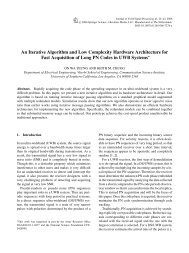Irreducible Polynomials Which Divide Trinomials Over GF(2). - The ...
Irreducible Polynomials Which Divide Trinomials Over GF(2). - The ...
Irreducible Polynomials Which Divide Trinomials Over GF(2). - The ...
- No tags were found...
Create successful ePaper yourself
Turn your PDF publications into a flip-book with our unique Google optimized e-Paper software.
Hence, if f(x) divides no trinomial of degree < t, then f(x) will never divide anytrinomials.This provides a finite decision procedure for whether a given irreduciblepolynomial ever divides trinomials. Also, an irreducible polynomial f(x) either dividesinfinitely many trinomials, or divides no trinomials. In the following, we show that everyprimitive polynomial divides infinitely many trinomials, and present a whole family ofirreducible polynomials x t−1 + x t−2 + . . . + x + 1 which divide no trinomials.<strong>The</strong>orem 4. If f(x) is a primitive polynomial of degree n (i.e. if t = 2 n − 1), then f(x)divides trinomials.Proof. Since α is a root of f(x), the powers1, α 1 , α 2 , α 3 , . . . , α t−1are all distinct, and constitute all the non-zero elements of the field <strong>GF</strong>(2 n ).Hence, for all i, 0 < i < t,1 + α i = α j for some j ≠ i, 0 < j < t.Thus, f(x) divides x i + x j + 1 for each such pair (i, j).In fact, when f(x) is a primitive polynomial, it divides exactly (t − 1)/2 trinomials ofdegree less than t. Since the primitive polynomials precisely correspond to m-sequences,10









